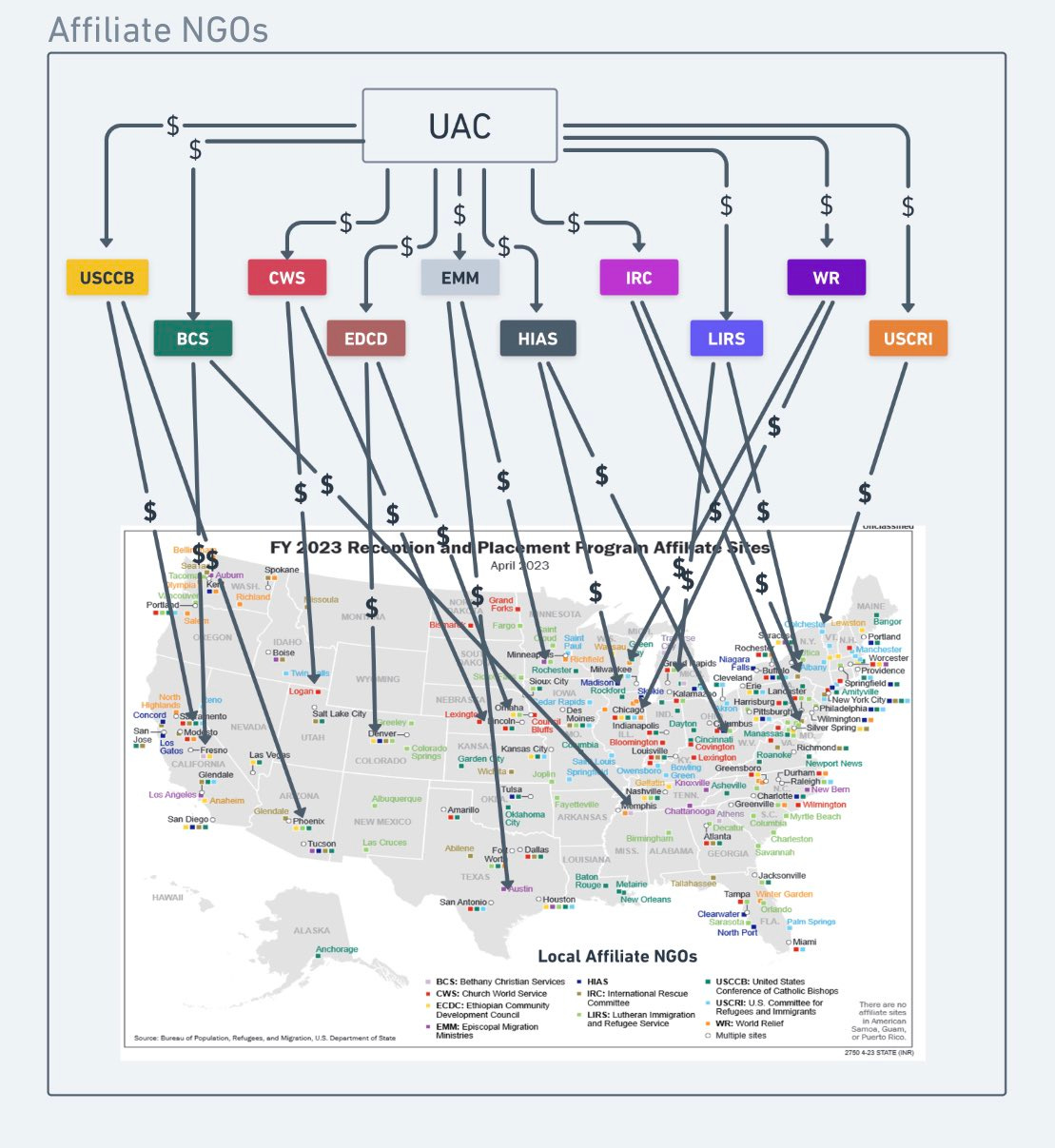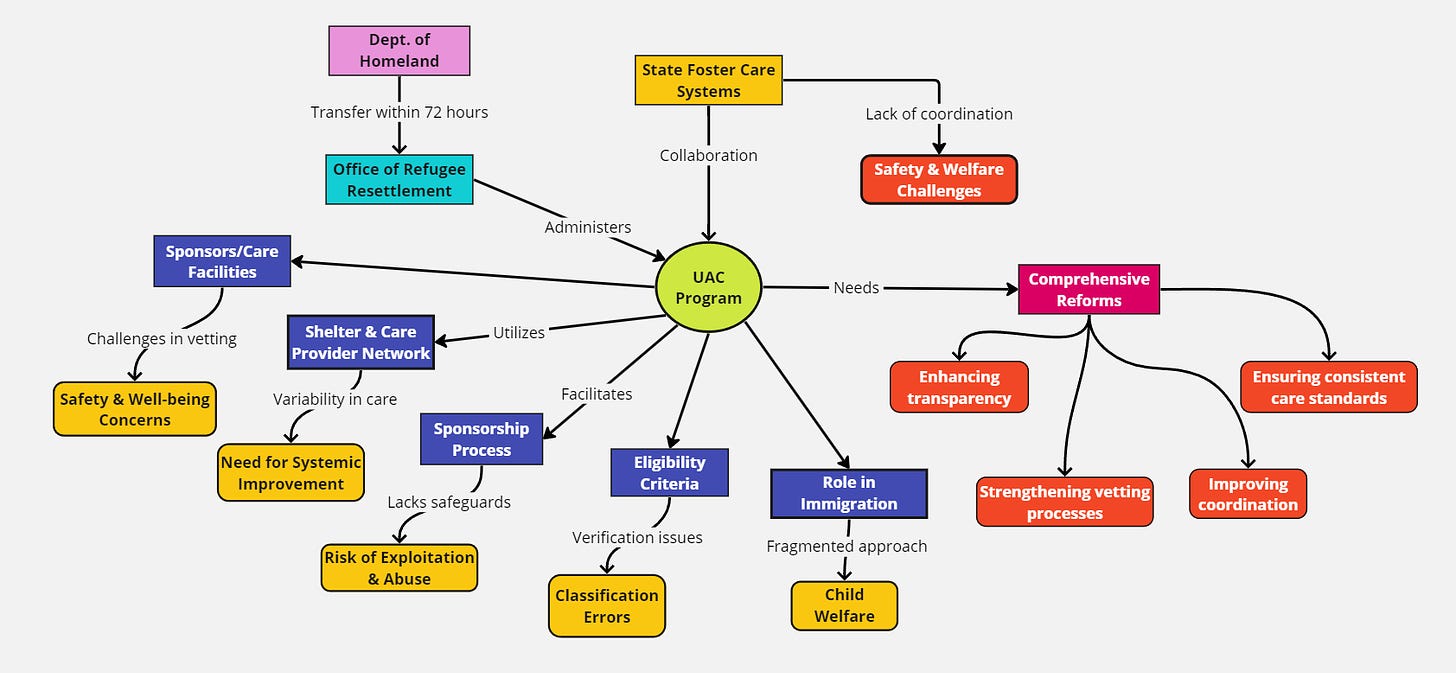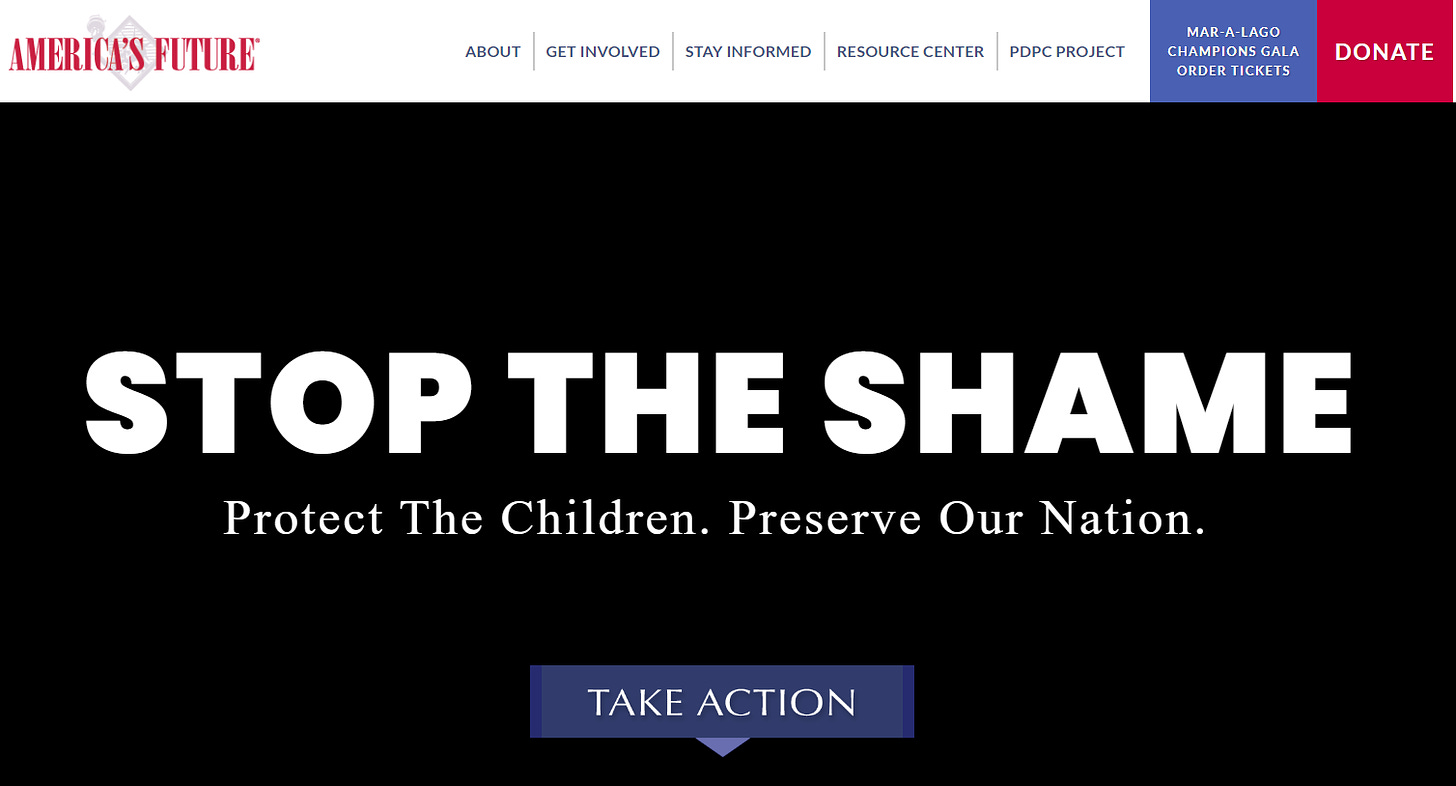Introduction
Imagine being a child, alone and terrified in a foreign country. Promised safety and care, you instead find yourself trapped in a broken system, reduced to just another statistic. This is the grim reality for hundreds of thousands of unaccompanied children in the United States, victims of grossly mismanaged federal programs and a glaring lack of oversight.
In addition to being failed by these programs, these children are also preyed upon by ruthless Mexican cartel coyotes. Their parents pay exorbitant sums, forcing these young ones to work off their debt through a nightmarish journey. Their trek through the treacherous Darién Gap is filled with unimaginable horrors—witnessing people burning, dying, and being dismembered. They see unspeakable abuses committed in the shadows of trees along their path. This is the hell they endure to reach the U.S. border.
Upon arrival, they are crammed into overcrowded holding facilities resembling tent city jails. But the nightmare doesn't end there. These children are then handed over to so-called "sponsors" who are often listed on international crime databases known as the transnational crime list. From there, they are sold into the dark world of slavery, subjected to horrifying conditions.
And then, after all that suffering, they vanish—disappearing into the abyss, never to be seen again. Welcome to the United States of America, the world's number one purchaser of child exploitation. Let that sink in for a moment. While we are kept perpetually busy by our government, struggling to manage our own health, our families, and our children, hundreds of thousands of others have no voice, no one to fight for them.
Exposure
My purpose is to expose the gross negligence and complicity of NGOs and government agencies in the mishandling and exploitation of vulnerable children. This is well-documented in Senate hearings, state grand jury investigations, and whistleblower accounts which have brought to light the epic and unfounded neglect and negligence where children suffer greatly. These institutions, entrusted with the care of the most defenseless among us, have failed catastrophically, allowing children to fall prey to exploitation and abuse. This article aims to shine a spotlight on these failings and call for accountability and reform.
Assistance Listing Number (ALN) Programs
The Assistance Listing Number (ALN) programs are designed to provide crucial support and services to vulnerable children, both domestic and immigrant. These programs aim to ensure the safety, health, and well-being of children who find themselves in precarious situations, such as unaccompanied minors and children in the foster care system. They are intended to offer a safety net, providing resources for shelter, education, healthcare, and other essential needs to help these children thrive.
Definitions
Unaccompanied Alien Child (UAC)
An Unaccompanied Alien Child (UAC) is defined by U.S. law as a child who:
Has no lawful immigration status in the United States.
Is under 18 years of age.
Has no parent or legal guardian in the United States or no parent or legal guardian in the United States is available to provide care and physical custody.
These children are typically apprehended at the U.S. border and transferred to the care of the Office of Refugee Resettlement (ORR) under the Department of Health and Human Services (HHS) for placement and care.
Unaccompanied Refugee Minor (URM)
An Unaccompanied Refugee Minor (URM) is a refugee child under the age of 18 who arrives in the United States without a parent or legal guardian. These minors are placed in the Unaccompanied Refugee Minor Program, which is designed to provide them with foster care and other essential services such as education, healthcare, and counseling. The program aims to help these children achieve self-sufficiency and integrate successfully into American society.
Overview of Programs
93.566: Refugee and Entrant Assistance State Replacement Designee Administered Programs
Introduction
The Refugee and Entrant Assistance State Replacement Designee Administered Programs (CFDA 93.566) are a critical part of the United States' effort to assist refugees and entrants in their transition to life in the country. These programs provide funding and support to ensure that refugees, asylees, Cuban and Haitian entrants, and other eligible populations receive the necessary assistance to become self-sufficient and integrated members of American society.
Overview of the Program
The CFDA 93.566 is managed by the Office of Refugee Resettlement (ORR), which operates under the Administration for Children and Families (ACF) within the U.S. Department of Health and Human Services (HHS). The program's primary goal is to provide comprehensive services to refugees and entrants to promote their economic self-sufficiency and social integration.
93.658 - Foster Care Title IV-E Program
Introduction
The Foster Care Title IV-E program, designated as CFDA 93.658, is a federal initiative that provides funds to states, territories, and eligible tribes for foster care maintenance payments, administrative costs, training, and other related expenses. Managed by the Children's Bureau within the Administration for Children and Families (ACF) of the U.S. Department of Health and Human Services (HHS), this program is intended to support the safety, permanence, and well-being of children in foster care. However, despite its goals, the program faces significant challenges and criticisms that reveal deep systemic issues.
Overview of the Program
While the Title IV-E Foster Care program aims to provide safe and stable out-of-home care for children, real-world implementation often falls short. The program’s funding supports a range of services, including foster care maintenance payments, administrative costs, and training for foster care providers. Despite these efforts, many children in the foster care system face severe issues, including abuse, neglect, and instability.
93.676: Unaccompanied Children Program
Introduction
The Unaccompanied Children (UC) Program, designated as CFDA 93.676, is managed by the Office of Refugee Resettlement (ORR), a division of the Administration for Children and Families (ACF) within the U.S. Department of Health and Human Services (HHS). The program is designed to address the unique needs of unaccompanied children who enter the United States without lawful immigration status and without a parent or legal guardian. These children are placed under the custody of the ORR to ensure their care, safety, and well-being while they undergo immigration proceedings.
Overview of the Program
The UC Program provides for the safe and humane treatment of unaccompanied children from the moment they are transferred to ORR custody until they are released to a qualified sponsor. The program includes several key components such as shelter, medical care, educational services, legal services, and post-release services.
93.576: Refugee and Entrant Assistance Discretionary Grants
Introduction
The Refugee and Entrant Assistance Discretionary Grants program (CFDA 93.576) is intended to support the integration and self-sufficiency of refugees, asylees, Cuban and Haitian entrants, and other eligible populations in the United States. However, despite the significant financial investments and well-intended objectives, the program has faced substantial criticism and challenges that have hindered its effectiveness.
Overview of the Program
The program funds various projects aimed at enhancing employment opportunities, providing language and vocational training, improving access to healthcare, and fostering community integration. These projects are crucial for helping refugees and entrants transition to life in the U.S. and become contributing members of society. Nonetheless, the real-world execution of these programs has often fallen short of these goals.
93.583: Refugee and Entrant Assistance Wilson/Fish Program
Introduction
The Wilson/Fish (WF) Alternative Program, designated as CFDA 93.583, is managed by the Office of Refugee Resettlement (ORR) within the Administration for Children and Families (ACF), part of the U.S. Department of Health and Human Services (HHS). The Wilson/Fish program is an alternative to the traditional state-administered refugee assistance programs, aimed at providing integrated assistance and services to refugees, asylees, and other eligible populations. This program is designed to address gaps and inefficiencies in the state-administered programs by offering a more flexible and innovative approach to refugee resettlement and integration.
Overview of the Program
The Wilson/Fish program provides grants to states and non-profit organizations to administer comprehensive services to refugees and other eligible populations. The program focuses on achieving self-sufficiency and effective integration of refugees into American society through coordinated service delivery, employment services, and other support mechanisms.
Cash and Medical Assistance (CMA) Grant
The CMA grant primarily reimburses states and replacement designees (RDs)—non-state entities that administer resettlement programs—for three main services:
Associated administrative costs for each of these services are also covered. ORR-eligible populations who are ineligible for Temporary Assistance for Needy Families (TANF) and/or Medicaid can receive RCA and/or RMA for up to 12 months from their date of eligibility.
The Refugee Cash Assistance Program: An Overview
The Refugee Cash Assistance (RCA) program is a critical component of the support system provided to refugees resettling in the United States. This program is designed to offer financial assistance to eligible refugees to help them meet their basic needs during the initial months of resettlement. Understanding the mechanics of the RCA program, including funding allocation, eligibility, and duration of assistance, is essential for grasping its impact and administration.
Funding Allocation and Eligibility
The RCA program is funded through federal grants provided by the Office of Refugee Resettlement (ORR), which operates under the U.S. Department of Health and Human Services (HHS). These funds are then distributed to states, which administer the program either directly or through contracts with local resettlement agencies.
Eligibility Criteria
Refugee Status: To qualify for RCA, individuals must be recognized as refugees, asylees, Cuban/Haitian entrants, Amerasians, or victims of human trafficking.
Income and Resources: Eligibility is typically based on the refugee’s income and resources. Generally, applicants must have income below a certain threshold, which varies by state but is often aligned with the federal poverty level.
Timeframe: Refugees are usually eligible for RCA for up to eight months from the date of their arrival in the United States or the date they were granted asylum.
Refugee Medical Assistance (RMA)
Introduction
Refugee Medical Assistance (RMA) is a federal program administered by the Office of Refugee Resettlement (ORR) under the Administration for Children and Families (ACF) within the U.S. Department of Health and Human Services (HHS). The program provides health care coverage to refugees and other eligible populations during their initial resettlement period in the United States. RMA is designed to ensure that refugees have access to essential medical services, thereby supporting their overall well-being and successful integration into American society.
Overview of the Program
RMA offers short-term health care coverage to newly arrived refugees who are not eligible for Medicaid. This program serves as a critical safety net, providing essential medical services to vulnerable populations who may have fled from conflict, persecution, or other traumatic situations. The assistance typically lasts for up to eight months from the date of arrival or the date asylum is granted.
Unaccompanied Refugee Minors (URM) Program
Introduction
The Unaccompanied Refugee Minors (URM) program and the Unaccompanied Alien Children (UAC) program are both designed to provide care and support for vulnerable children who arrive in the United States without a parent or legal guardian. Despite their similar goals, these programs differ significantly in terms of eligibility, administration, and the specific services they provide. This document provides an in-depth examination of the URM program and outlines the key differences between URM and UAC.
Overview of the Program
The URM program is a federally funded initiative managed by the Office of Refugee Resettlement (ORR) under the Administration for Children and Families (ACF) within the U.S. Department of Health and Human Services (HHS). The program provides specialized foster care and other services to unaccompanied minors who are refugees, asylees, or other eligible populations, ensuring they receive the care and support needed for successful integration into U.S. society.
Systemic Failures
Systemic failures at state and local levels often result from merging various programs and managing substantial funds, creating opportunities for exploitation and negligence. Numerous sub-programs within primary assistance programs further entrench NGO control, perpetuating inefficiency and neglect.
Impact on Children
The merging of domestic and immigrant child welfare systems strains resources, leading to inadequate care for both groups. The influx of unaccompanied immigrant children and increasing numbers of domestic children requiring welfare services overload court systems, particularly immigration courts. For example, in FY 2023, 1,488,110 new cases were recorded, far outstripping the 669,011 cases completed, leaving more than two million active cases pending at the end of September 2023.
Domestic Children
The overburdened system negatively impacts domestic children by leading to inadequate foster care placements. With resources stretched thin, many children do not receive timely care, resulting in increased instances of runaways and "throwaway" children. The Florida Grand Jury investigation highlighted that domestic children often fall through the cracks due to the overwhelming number of cases that social workers and foster care providers must handle, compromising care quality and increasing abuse and neglect risks.
Immigrant Children
Immigrant children face specific vulnerabilities, including being sold into slavery and labor exploitation. The Grand Jury findings indicate that many unaccompanied immigrant children are released into the country without proper vetting or tracking, making them prime targets for traffickers. The report detailed numerous cases where children were placed with inadequately screened sponsors, leading to labor exploitation and abuse. The lack of proper oversight and the volume of cases mean many immigrant children are not effectively monitored, increasing their risk of falling into dangerous situations.
Examples of Misuse
The Grand Jury report cites financial discrepancies and misuse of funds. Nonprofits like Catholic Charities of San Diego and Jewish Family Services have guided migrants on bypassing TSA security screening and navigating the U.S. legal system, facilitating illegal migration. Additionally, migrants receive debit cards loaded with funds from U.S. taxpayers, refilled monthly by the UN-IOM.
Monopoly of NGOs
The landscape of refugee and child welfare assistance is dominated by ten major resettlement agencies and their 341 local affiliates. These organizations include entities like Catholic Charities, Lutheran Immigration and Refugee Service, and the International Rescue Committee. Each plays a critical role in the resettlement process, leveraging extensive networks to provide services across the country.
Financial Exploitation
These NGOs receive substantial funding from federal government and international donor agencies. Federal agencies such as the Department of Homeland Security (DHS), the Department of Health and Human Services (HHS), and the Department of State (DoS) channel hundreds of millions of dollars annually into these organizations. Additionally, the United Nations International Organization for Migration (UN-IOM) funnels funds from the U.S. Treasury to support these NGOs, providing money, transportation, and housing to individuals traveling to the U.S. border.
Despite their vast financial resources, many NGOs fail to protect the children they are supposed to serve. They often misuse their tax-exempt status and the trust of U.S. taxpayers by encouraging migratory travel under the guise of humanitarian aid, exacerbating the risks and harm migrants face. The Florida Grand Jury investigation highlighted that these NGOs often incentivize migration through the provision of cash cards, transportation, and other resources that facilitate illegal crossings.
A glaring example of financial discrepancies and misuse of funds is detailed in the Florida Grand Jury's findings. Nonprofits such as Catholic Charities of San Diego and Jewish Family Services were found secretly transporting and lodging undocumented migrants, providing guidance on bypassing TSA security screening and navigating the U.S. legal system. Additionally, before reaching the southern border, migrants receive debit cards loaded with hundreds of dollars, refilled monthly, funded by U.S. taxpayer money through the UN-IOM.
Further investigations revealed that the International Organization for Migration (IOM) issued transportation loans amounting to over $1 billion, of which only a fraction was recovered. NGOs tasked with collecting these loans are allowed to retain a portion of the recouped funds, creating a vested financial interest in the number of refugees brought into the U.S. This practice highlights a significant conflict of interest and potential financial exploitation.
The system is rife with inefficiencies and mismanagement. Substantial funding is funneled through a few dominant NGOs who prioritize financial gain over the quality of services provided. This troubling monopoly undermines humanitarian efforts and perpetuates inefficiency and neglect. Alongside primary assistance programs, numerous sub-programs within them further entrench NGO control and perpetuate inefficiency and neglect. This complex network of interactions, driven by financial interests rather than humanitarian needs, calls for urgent reform and greater accountability.
Documented Issues and Lack of Oversight
The Florida Grand Jury investigation reveals numerous systemic issues within refugee and child welfare programs, primarily due to severe lack of oversight and accountability. Federal penalties for illegal immigration offenses are rare despite frequent violations, leading to a system overwhelmed by bureaucratic inertia and human tragedy. Cartels exploit this situation for crime and profit, while NGOs and government agencies often fail to manage and oversee these programs adequately, causing significant harm to vulnerable populations.
Missing Children
A staggering number of children go missing from care facilities, often falling through the cracks of an overburdened system. The Florida Grand Jury found that many unaccompanied children are released into the country without proper tracking, leading to a high risk of them disappearing. The lack of proper documentation and oversight exacerbates this issue, leaving these children vulnerable to exploitation and abuse.
Trafficking and Abuse
The journey to the U.S. border is fraught with danger, as highlighted by eyewitness testimonies and media reports. Migrants, including children, face brutal conditions, including being preyed upon by cartels and gangs. The investigation details horrific experiences such as kidnapping, extortion, and sexual abuse. NGOs and government agencies, despite being aware of these dangers, often fail to provide adequate protection. For example, Doctors Without Borders reported that 68% of women and 17% of men were sexually abused during their journey, with some testimony before the House Subcommittee on Oversight of DHS suggesting figures as high as 80%.
Complicity and Negligence
Whistleblower accounts and the Grand Jury findings indicate gross negligence and complicity by NGOs and government agencies. Nonprofits like Catholic Charities and Jewish Family Services have been implicated in secretly transporting and lodging undocumented migrants while failing to ensure their safety. These organizations often prioritize financial gain over the welfare of those they are supposed to help, creating a cycle of inefficiency and neglect. The United Nations International Organization for Migration (UNIOM) provides resources like "rape kits," knowing the high likelihood of sexual violence along migration routes, yet this does not translate into effective protective measures.
Proposed Measures
To address these critical issues, the following measures are proposed:
Immediate Action: Voting "yea" for the Congressional Review Act (CRA) resolution currently in Congress. This resolution aims to increase accountability and oversight of federal agency rules, ensuring they comply with required procedural steps and do not adversely impact child welfare systems.
Regular Audits and Independent Oversight: Implement more frequent and thorough audits, along with independent oversight bodies, to ensure funds are used effectively and the welfare of children is prioritized over financial interests.
Real-Time Monitoring: Advocate for real-time tracking systems to monitor the well-being of children in care facilities. This would involve using technology to track the location and status of each child, ensuring they receive timely and appropriate care.
Improved Monitoring: Specific improvements in monitoring and site visits are essential. This includes regular and unannounced inspections of care facilities to ensure compliance with safety and care standards.
Whistleblower Encouragement: Emphasize the need for stronger whistleblower protections and encourage more individuals to come forward with information about abuses and inefficiencies within the system. Whistleblowers play a crucial role in exposing neglect and misconduct, and their protection is vital for accountability.
Community Involvement: Encourage greater involvement from community organizations and local stakeholders. Local communities can provide additional oversight and support, ensuring the needs of both domestic and immigrant children are met effectively.
Conclusion
The merging of domestic and immigrant child welfare systems has highlighted severe inefficiencies and neglect. Urgent reform and increased accountability are necessary to protect vulnerable children and ensure effective use of resources. Voting for the CRA resolution is a crucial step toward these goals. Alongside this, implementing regular audits, real-time monitoring, and stronger whistleblower protections will help ensure the welfare systems function ethically and efficiently.
Call to Action
We explored the profound issues within the merging of domestic and immigrant child welfare systems, highlighting how the influx of unaccompanied immigrant children and the increasing number of domestic children in need have overwhelmed the system. This convergence has led to systemic failures, including lack of oversight, inadequate care, and severe exploitation and abuse of vulnerable children. The Florida Grand Jury's findings underscore the dire consequences of these systemic issues, including financial exploitation by NGOs and government agencies and the significant backlog in immigration courts.
We also discussed the detrimental impact on domestic children, who face increased runaways and inadequate foster care placements, and on immigrant children, who are at heightened risk of being sold into slavery and labor exploitation. The systemic negligence and complicity of NGOs and government agencies further exacerbate these issues, calling for urgent reform and accountability.
To address these pressing issues, we propose several measures:
Voting "yea" for the Congressional Review Act (CRA) resolution in Congress to increase oversight and ensure compliance with procedural requirements.
Implementing regular audits and independent oversight bodies to ensure effective use of funds and prioritization of child welfare.
Advocating for real-time tracking systems to monitor the well-being of children in care facilities.
Improving monitoring and site visits to ensure compliance with safety and care standards.
Strengthening whistleblower protections to encourage more individuals to report abuses and inefficiencies.
Encouraging greater involvement from community organizations and local stakeholders.
I urge readers to get involved by supporting relevant organizations, contacting their representatives, and spreading awareness about these critical issues. Your support can help drive the necessary changes to protect vulnerable children and ensure our child welfare systems function effectively and ethically.
Written by SpartanAltsobaPatriot - 17th SOG
93.583 - Refugee and Entrant Assistance Wilson/Fish Program (690)
93.658 - Foster Care Title IV-E (4,953)
93.576 - Refugee and Entrant Assistance Discretionary Grants (5,132)
93.676 - Unaccompanied Children Program (7,812)
93.566 - Refugee and Entrant Assistance State/Replacement Designee Administered Programs (7,864)















It's absolutely heartbreaking!